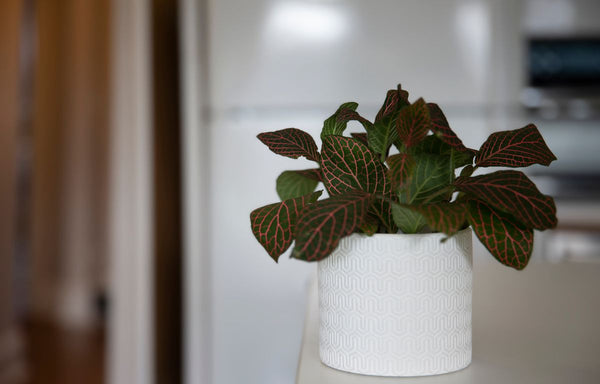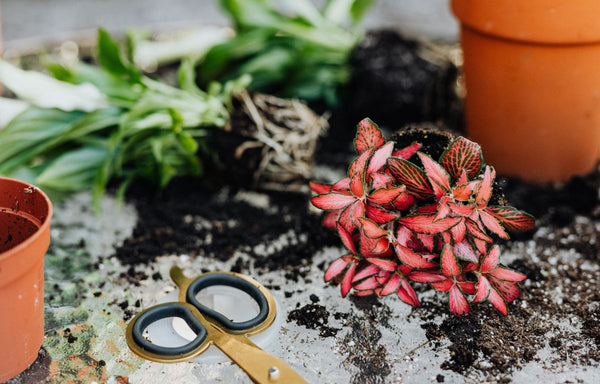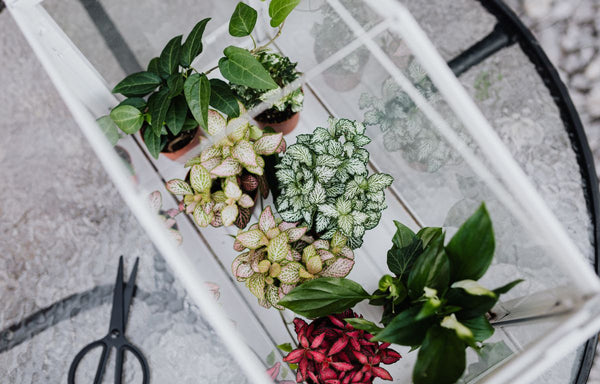
Plant Profile: Fittonia ‘Nerve Plant’
Plant Profile: Fittonia ‘Nerve Plant’
Fittonia or Nerve Plants are renowned for their captivating foliage. The leaves feature contrasting, intricate patterns of veins that resemble a network of nerves, giving the plant its popular name. These patterns come in a variety of colours, including vibrant greens, pinks, and whites. Fittonia plants are available in different cultivars, each with its own unique leaf patterns and colours, making it a versatile choice for interior decoration.

Position: The plant's compact size allows for versatile placement options, making it suitable for various settings and interior design styles whether it be a welcoming feature at your front door or as a pop of colour on your kitchen bench top.
Fittonias thrive in moderate to bright sunlight making it ideal for indoor settings. However, the leaves can easily burn in a hot summer sun. To avoid this, make sure the sunlight is filtered during the warmer seasons.
Fittonia Plants are flowering plants and can produce tiny yellow flowers when they feel like it. For those of us who are new to the indoor plant experience, don’t be disappointed if these never appear as it requires very specific growing, ambient temperatures, and sunlight conditions to do so. Those more advanced plant enthusiasts may, however, relish the additional challenge.
Temperature: Fittonia are native to the tropical rain forests of Peru so prefer a warm humid environment with consistent temperatures somewhere between 18-30C.
They are very sensitive to cooler temperatures. If it falls below 16C the leaves may wilt and drop off. As soon as this occurs, move your plant into a warmer environment.
Water: This is a plant that loves to stay hydrated. A regular watering schedule should be in place to keep the roots and soil free draining but consistently moist.
It will also benefit from the occasional spritzing of water to simulate a humid tropical environment.
Soil: Fittonia naturally grows on the forest floor, so they are regularly exposed to nutrient runoff from larger trees and microbes found in the soil. Because of this, they will thrive with a premium potting mix that has an assortment of minerals and nutrients, well water-draining and a slightly acidic pH level of around 6.5.
The nutrients absorbed by the plant will need to be regularly replaced with either a liquid or pellet form fertiliser every month or so.

Problems and Solutions:
Although Fittonia plants love water there is still the danger of overwatering. If this occurs, the leaves will turn yellow in colour. It likely means that too much water is collecting at the bottom of the pot, and you will need to either re-pot your Fittonia plant with new soil or mix in dry soil to soak up some of the excess water.
Conversely, the leaves will droop or become brittle to the touch if it
feels underwatered. A decent drink should be enough to have it pop right back
up. However, if it is still lethargic looking, this can be a sign that the
plant is either too cold or it has been too long between watering and is now
too dry or damaged making it unable to absorb water. Unfortunately, you may
not be able to resurrect your plant at this stage.
Having said that, if there are still sections of the plant that look and
feel healthy you may want to try your hand at propagation. All you need to do
is cut the healthy stem from the base and place it in a vessel of water. Once
roots have formed you can then pot with soil.
As the plant does prefer a moist soil consistency in combination with a
warm environment, mould can easily grow and spread. Carefully lift the bottom
leaves of your plant to see if any furry white spots have developed on the
soil. If it has, best to remove your plant to sterilise the pot before
planting it up again with entirely new soil.

Fittonia foliage makes this plant a stunning addition to any space and they're hardy enough to withstand a few lapses in care. Best of all, Fittonias are excellent at purifying air in the home, reducing stress and anxiety, and have the added benefit of being non-toxic to curious cats and dogs!
You may also enjoy learning about the Chinese Evergreen - Auspicious Red.
